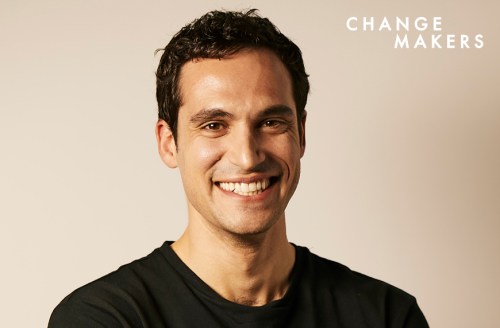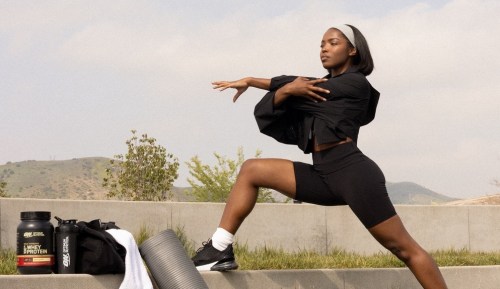‘Sleep is the new steps,’ according to WHOOP founder Will Ahmed—here’s why
Will Ahmed, the founder of WHOOP, talks about the future of wellness, fitness trackers, and how wearable devices can help you be healthy.

Fitness trackers and activity monitors have come a long way from the basic pedometer era. These days, many of us are collecting data not just on steps, but on sleep, stress, and other biomarkers that offer clues to how well we truly are.
But if you ask Well+Good’s 2020 Changemaker Will Ahmed, an abundance of data is essentially meaningless without knowing what to do with it—which is the idea that inspired him to create WHOOP, a tracker that measures heart rate variability and sleep quality (among other metrics) and serves up suggestions to improve performance and well-being. Below, Ahmed talks with W+G’s executive editor Abbey Stone about the genesis of WHOOP, screen time, and where he predicts wellness is headed next.
Well+Good: When you launched WHOOP, what white space were you seeing in the field at the time?
Will Ahmed: Well, the biggest thing that I learned from doing a lot of research at Harvard was that, essentially, there are secrets that your body is trying to tell you in the form of physiological indicators. The problem is that there wasn’t technology that could measure them. I saw an opportunity to measure things at an accuracy level that had never been done before, and then to provide coaching—using that information to provide actionable feedback. The problem with wearables 1.0 is they gave you information, but you didn’t necessarily know what to do with it. Whereas with WHOOP, we collect more data than anyone else, we try to simplify the information we give you, and we try to make it actionable.
Has WHOOP’s mission or goal evolved since those early days?
Since the early days, our mission has been to unlock human performance. What we’ve seen is that the market for people who are fascinated by human performance has grown. With the very early version of WHOOP, human performance meant the best athletes in the world. Today, human performance means fitness enthusiasts, endurance competitors, people who want to perform better at work, people who are competitive in their daily lives, people who aspire to get more sleep. The concept of how can you improve your performance now appeals to a much larger audience.
The wellness space has blown up in the last few years. Where do you think some of the biggest areas for growth and opportunity are?
In general, the space could use a lot more validation and research. It tends to be very fad-driven. I believe that whether it’s a diet or an exercise or a new behavior that you’re trying to implement to improve your wellness, it needs to be right for you. Very rarely is one thing right for everyone. And yet, the wellness industry has, in my opinion, a somewhat clumsy way of introducing a new thing as being right for everyone.
At WHOOP, we try to look at how specific data is affecting you. So, for example, we’ve worked with people who have had great success on a Paleo diet, or a plant-based diet, or going into ketosis. On the flip side, we’ve had people try all three of those, and it’s had terribly negative effects on their WHOOP data. I think that the wellness industry needs to recognize just how individualized the results are. It’s a personal experience.
“Sleep has become the new steps. People have gotten over this idea of 10,000 steps being even remotely relevant.” —Will Ahmed, founder and CEO, WHOOP
On the flip side, what are some changes in the wellness space that you’re really excited about?
Just the fact that people seem to be talking more and more about wellness is a good thing. I think sleep has become the new steps. People have gotten over this idea of 10,000 steps being even remotely relevant. Now they’re really gravitating to, “Okay, how can sleep improve my lifestyle, make me happier, make me more productive?” It’s something that we do a lot of research around because WHOOP is a very accurate sleep monitor. My bias is to believe that you can only manage what you measure. If you think sleep is important, but you don’t measure how you sleep, it’s very hard to manage it.
When you’re thinking about the next phase for WHOOP, what do you turn to for inspiration?
Broadly speaking, human performance. Anything that we hear about that’s helping people perform at a higher level, we get excited about that. We’re generally quite inspired by people who perform at a high level and we always want to learn as much as we can about their behaviors and their diets and their habits. That’s information that we think we can build technology around, and we can hopefully make WHOOP members perform better.
Are there any particular areas where you are focusing your research in terms of untapping human potential in the future?
Recovery is a big focus for us: strain in the form of exercise, stress in the form of daily activity. Really, a lot around behaviors and how they affect your body. Again, things like diet, meditation, breathing, different supplements—these are all different components that affect your life. Human performance is figuring out what’s the perfect recipe for you to perform at a higher level.
When you hear back from people who have used WHOOP and have changed their daily habits, are there any common chords that keep coming up with them?
One is spending more time in bed. Another is having more efficient sleep—realizing how much alcohol and caffeine affect sleep. And a lot of people are very driven—they’re capable of over-pushing their body or burning out—and WHOOP in some ways gives them an excuse to rest more. We’re very proud of that! In a lot of ways, WHOOP is the first fitness product telling you not to exercise.
“I think the secret to feeling optimal—in any context of life—is balance.”
For so long, the emphasis was on working out harder, better, faster, stronger. Now there seems to be greater awareness of the need to rest and recover. I’d love to hear a little bit more of your thoughts on this change.
I think the secret to feeling optimal—in any context of life—is balance. In the athletic context, that’s the idea of strain and recovery. If your body is more recovered, you take on more strain. If your body’s less recovered, you take on less strain. What I felt I witnessed as a college athlete is that the pendulum had swung way on the side of strength. It wasn’t just “Can you do a two a day?” It was, “Can you do three a day?” The idea that more is more is more.
For me, I was an athlete who used to overtrain. So I got interested in how to prevent overtraining. Sure enough, the way to do that is to recover better, and then to make sure that when you’re not recovered, you take on less strain. It was my belief that it was actually more important what you were doing the other 20 hours of the day, not just those two, three, or four hours that you’re exercising.
On the flip side of that, we’re seeing that everyone’s using their phones 24/7. They’re constantly plugged into work or their social lives, and they’re stimulating their minds all the time. The result is that if you don’t also recover and take a break, you’ll feel run-down. That corporate culture of working harder and harder—I think there’s a real rebellion right now in that people are realizing that they’re burning out or not happy. A lot of that comes back to whether you’re getting enough sleep, having a good bedtime routine. That’s really the secret: How do you balance the stress in your life with rest or recovery? It doesn’t matter if you’re a professional athlete or someone who just wants to do a better job in their daily life. You’ve got to figure out that balance.
You’ve mentioned mindfulness a few times, and that term can mean a few different things for different people. How do you define it?
When I think of mindfulness, I think of some combination of reflection, gratitude, and breath work. Personally, I practice Transcendental Meditation. I like to meditate once a day for 22 minutes: warm-up for about 30 seconds, repeating a mantra for about 20 minutes, and then exiting for two minutes. It’s intentionally very specific.
Do you have any visions or hopes for wellness in the coming year?
I hope that everyone can find balance in their lives. I think that there are a lot of things in this world to be grateful for, excited for, and happy about. And I think it’s important that people find ways to balance their lives in a way that they can appreciate it.
Will Ahmed is one of the people shifting the world of wellness. Want to meet more forward thinkers? Check out our list of the 2020 Changemakers here.
Sign Up for Our Daily Newsletter
Get all the latest in wellness, trends, food, fitness, beauty, and more delivered right to your inbox.
Got it, you've been added to our email list.










